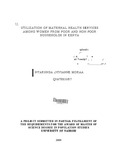| dc.description.abstract | Improvement in maternal health is one of the Millennium Development Goals (MDG) with a specific target of reducing by three-quarters between 1990 and 2015, the maternal mortality ratio. Although there has been an overall improvement in maternal health over the years, this has not benefited the entire population equally with studies showing that very low proportions of women from lower wealth quintiles attend antenatal clinics or are delivered under the care of health professionals.
The objective of this study was to examine the patterns and determinants of utilization of maternal health care in Kenya among women from poor and non-poor households using data drawn from the Kenya Demographic and Health Survey of 2003 (KDHS), which was a national representative survey. The study focused on births that took place during the three years prior to the date of the survey and the women were categorized as either poor or non-poor. A composite index was derived to categorize utilization of maternal health services as either adequate or not adequate.
The study made use of simple percentages to show the distribution of the respondents by the selected background variables and bivariate analysis to show the association between the dependent variables and the independent variable. Logistic regression was used to show the effect of the various factors on adequate utilization of health services for women from poor and non poor households.
The study established that, whereas poverty is a factor in determining whether a woman will utilize maternal health services adequately, there are still a number of women from non-poor households who do not utilize maternal health services adequately. Education was found to be a significant factor in determining whether a woman will adequately utilize maternal health services whether they were poor or non-poor. Education however had a higher positive effect for women from non-poor households compared to those from poor households. Region of residence had an effect in the chance that a woman adequately utilized maternal health services whether they were from poor or non-poor households. Urban residence increased the likelihood of adequate utilization of maternal health services but it had a higher positive effect for women from non-poor households relative to their counterparts from poor households.
The order of birth was an important determinant for the adequate utilization of maternal health services for women both from poor and non-poor households. Higher order births decreased the likelihood of using the services adequately. While the current working status of a woman did not show any significant effect on adequate utilization for women from poor households, a woman's current working status had significant positive effect on adequate utilization of maternal health services for those from non-poor households. Whereas the study did not establish a significant relationship between age, marital status and autonomy in decision making on matters to do with the health of the women, with adequate utilization of maternal health services among women from poor households; there was a weak relationship between the dependent variable and autonomy in decision making on matters to do with the health of the women for those from non-poor households.
The results of this study are consistent with earlier studies on determinants of utilization of maternal health care. The effects of various factors however, have varied impacts on adequate utilization of maternal health services for women from poor and non-poor households. It is therefore recommended that there should be specific interventions targeting women from poor households to encourage them to use all the components of maternal health care, that is, early timing of antenatal care, at least four visits and delivery under the care of a health professional. At the same time, all women should be sensitized on the importance of adequate utilization of maternal health services, preferably through media, to minimize effects of obstetric complications and reduce maternal mortality. | en_US |

